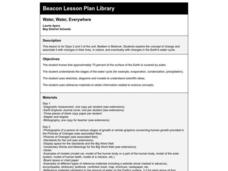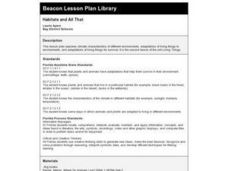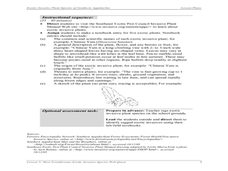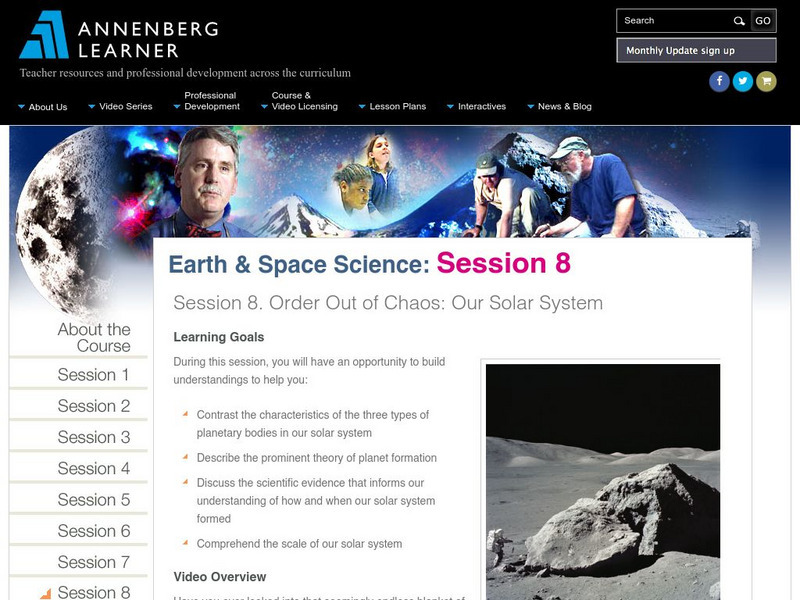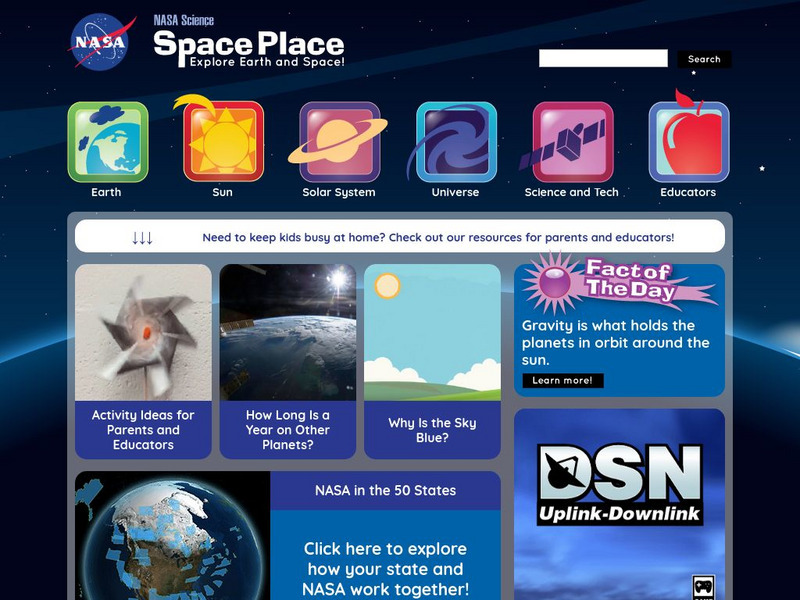Curated OER
Amazing -- Saturn Is So Far Away!
Learners work together to create a scale model of the distances between the planets. They write a paragraph to describe Saturn and their make-believe trip to the planet. They identify other characteristics of Saturn as well.
Curated OER
Gaia: The Wisdom of the Earth
Learners are introduced to Gaia theory of natural homeostasis. They graph Earth's temperatures over time, construct terrariums or monitor the outdoor environment. Related videos titles are suggested, but may be outdated. The objectives...
Curated OER
The Planets Moon
Students explore the theories of the creation of the universe and examine the properties of celestial bodies. They analyze the relationship between the sun, Earth and other planets. They discover the infinite potential of the science of...
Curated OER
A DISAPPEARING ACT Astronomy: Do Stars Always Shine?
Students observe why stars are not visible during the day with a classroom demonstration using an index card punched with holes.
Curated OER
Soaring Through Space With a Kid Pix Slide Show
First graders create a slide show on Kid Pix about space. In this space lesson plan, 1st graders will explore the earth, sun, moon, and planets. After exploring their motions and locations around the sun, they create a 4 page slide show...
Curated OER
Artificial Satellites and Space Probes
In this satellites worksheet, students match the list of facts given with the artificial satellite or space probe that it describes. This worksheet has 12 matching questions.
Curated OER
Soil Comparison and Analysis
Students perform tests on different soil samples. In this earth science lesson, students classify the soil into groups according to test results. They write a lab report following a certain criteria.
Curated OER
Understanding Cloud Formation
Students view a demonstration that simulates cloud formation. They read a poem about clouds, participate in a class demonstration using warm water and ice and write a paragraph summarizing their observations.
Curated OER
Habitats and All That
First graders read books, complete online explorations and discuss the ways in which animals adapt to their habitats in order to survive. They create accordion books, play matching games and dramatize animal adaptations.
Curated OER
Upgrading Hubble
Learners investigate the Hubble telescope's role in astrophysics research. They complete a Webquest, watch a video, view Hubble photographs, play online games, answer discussion questions, and evaluate newspaper articles about optics.
Curated OER
Cell Structure and Function
In this cells worksheet, students review the different types of cells. Students identify the organelles found in an animal cell and determine the function of these organelles. This worksheet has 14 matching, 6 fill in the blank, and 5...
Curated OER
A Tall Ship and a Star to Steer Her By
Students create a water transportation device powered by wind. In this wind power instructional activity, students research transportation concepts after reading the poem "Sea Fever" by John Masefield. Students design the fastest...
Curated OER
Maximum Power Point
Students investigate how to optimize the power output of a photovoltaic cell using a home-made gnomon stand. They use data collected to create current-voltage and power-voltage curves to determine the "maximum PowerPoint," (MPP) at which...
Curated OER
Webbing the Food Chain
Pupils compose a visual representation of the food chain cycle using Inspiration educational software.
Curated OER
Will There Be Ozone Tomorrow
Students collect and analyze real time data. They make comparisons and determinations about the status of ozone in their local area and predict the Ozone level for the next day
Curated OER
Most Troublesome Exotic Invasive Plant Species Web Quest
Students participate in a Web Quest activity in which they identify common exotic invasive plant species of the Southern Appalachian Region. After identifying the top 10 exotic invasive species, they choose one to research in depth.
Curated OER
Every Tree For Itself
Fourth graders play a game where they are trees gathering sun, water, and nutrients and CO2 represented by pieces of paper or poker chips. They record their collected requirements and graph how they grew as a forest.
CK-12 Foundation
Ck 12: Earth Science: Planets of the Solar System
[Free Registration/Login may be required to access all resource tools.] Examines the eight planets of our solar system and their orbits and rotation.
Annenberg Foundation
Annenberg Learner: Earth and Space Science: Order Out of Chaos: Solar System
Material to begin an exploration of the Solar System: the characteristics of the planets, theories about planet formation, and more. An hour-long video is accompanied by learning goals, an outline and overview, details on star formation,...
NASA
Nasa: Star Child: Elementary Astronomy Unit
Learn everything you can about outer space with this interactive astronomy unit. 2 levels of difficulty with modules on the solar system, the universe, other "space stuff" and a glossary of terms. Links for parents and other great website.
Crayola
Crayola: Extraterrestrials Visit Earth (Lesson Plan)
Your students will love wrapping up a solar system unit with this activity! Children make their own "Travel brochure," about earth, trying to encourage extraterrestrials to visit, by comparing our planet to theirs. This lesson plan also...
Utah State Office of Education
Utah State Office of Education: How Did the Universe and Solar System Develop?
Explore this unit to learn how the universe began. Through illustrations, videos, and classroom activities, gain an understanding of how stars help with the formation of elements.
Texas Education Agency
Texas Gateway: Ap Physics I: Appendices: Useful Information
This page provides eight tables of useful information such as Important Constants, Submicroscopic Masses, Solar System Data, Metric Prefixes for Powers of Ten and Their Symbols, The Greek Alphabet, SI units, Useful Formulae, and other...



